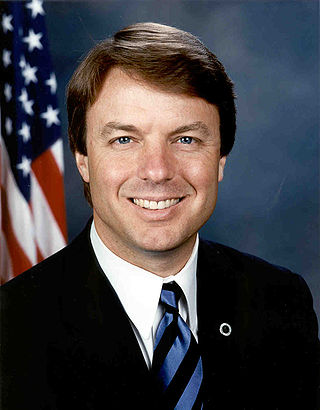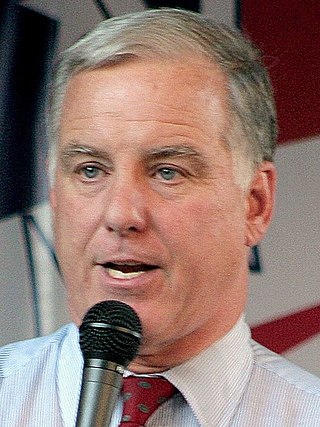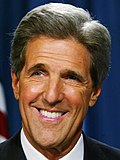
Richard Andrew Gephardt is an American attorney, lobbyist, and politician who represented Missouri's 3rd congressional district in the United States House of Representatives from 1977 to 2005. A member of the Democratic Party, he was House majority leader from 1989 to 1995 and minority leader from 1995 to 2003. He ran unsuccessfully for the Democratic nomination for President of the United States in 1988 and 2004. Gephardt was mentioned as a possible vice presidential nominee in 1988, 1992, 2000, 2004, and 2008.

From January 14 to June 8, 2004, voters of the Democratic Party chose its nominee for president in the 2004 United States presidential election.
The following is a timeline of events during the 2004 U.S. presidential election:

From January 3 to June 3, 2008, voters of the Democratic Party chose their nominee for president in the 2008 United States presidential election. Senator Barack Obama of Illinois was selected as the nominee, becoming the first African American to secure the presidential nomination of any major political party in the United States. However, due to a close race between Obama and Senator Hillary Clinton of New York, the contest remained competitive for longer than expected; neither candidate received enough pledged delegates from state primaries and caucuses to achieve a majority, without endorsements from unpledged delegates (superdelegates).

The 2008 Iowa Democratic presidential caucus occurred on January 3, and was the state caucuses of the Iowa Democratic Party. It was the first election for the Democrats of the 2008 presidential election. Also referred to as "the First in the Nation Caucus," it was the first election of the primary season on both the Democratic and Republican sides. Of the eight major Democratic presidential candidates, then-U.S. Senator Barack Obama of Illinois received the most votes and was ultimately declared the winner of the Iowa Democratic Caucus of 2008, making him the first African American to win the caucus and the first African American to win a primary state since Jesse Jackson in 1988. Former U.S. Senator John Edwards of North Carolina came in second place and then-U.S. Senator Hillary Clinton of New York finished third, though Clinton received more delegates than Edwards. Campaigning had begun as early as two years before the event.

The 2004 United States presidential election in South Carolina took place on November 2, 2004, as part of the 2004 United States presidential election which took place throughout all 50 states and D.C. Voters chose eight representatives, or electors to the Electoral College, who voted for president and vice president.

The 2008 United States presidential election in Iowa took place on November 4, 2008, as part of the 2008 United States presidential election. Voters chose seven representatives, or electors to the Electoral College, who voted for president and vice president.

The 2008 New Hampshire Democratic presidential primary on January 8, 2008 was the first primary in the United States in 2008. Its purpose was to determine the number of delegates from New Hampshire that would represent a certain candidate at the National Convention. In a primary, members of a political party—in this case, the Democratic Party—will select the candidates to a subsequent election. Since 1920, New Hampshire has always hosted the first primaries in the entire nation. The Democratic Party's primary occurred on the same day as the Republican primary.

The 2004 presidential campaign of John Edwards, U.S. Senator from North Carolina, began on September 16, 2003.

The 2004 presidential campaign of Howard Dean, 79th Governor of Vermont, began when he formed an exploratory committee to evaluate a presidential election campaign on May 31, 2002. Dean then formally announced his intention to compete in the 2004 Democratic primaries to seek the Democratic Party's nomination for President on June 23, 2003. Dean dropped out of the race in February 2004 after a poor showing in the Wisconsin primary.

The 2004 presidential campaign of Dick Gephardt, the Democratic former House Minority Leader and member of the U.S. House of Representatives from Missouri, was formally launched in February 2003. Gephardt had previously ran for the Democratic presidential nomination in 1988, but lost to Mike Dukakis. In 2002, Gephardt resigned as House Minority Leader to focus on his campaign.

The 2004 presidential campaign of Dennis Kucinich, House Representative of Ohio and former mayor of Cleveland, began in February 2003, with a formal announcement made in June. Ralph Nader praised Dennis Kucinich as "a genuine progressive", and most Greens were friendly to Kucinich's campaign, some going so far as to indicate that they would not have run against him had he won the Democratic nomination. However, Kucinich was unable to carry any states in the 2004 Democratic Primaries, and John Kerry eventually won the Democratic nomination at the Democratic National Convention.

The District of Columbia held a primary on January 13, 2004 and caucuses on February 14, 2004 during the 2004 Democratic presidential primary season. Delegates were only allocated in the February 14 caucuses.

The 2004 Oklahoma Democratic presidential primary, part of the process of selecting that party's nominee for President of the United States, took place on February 3, one of the seven nominating contests of 2004's "Mini-Tuesday". The primary election chose 40 pledged delegates to represent Oklahoma at the 2004 Democratic National Convention. The remainder of Oklahoma's 47 delegates consisted of unpledged superdelegates not bound by the results of the primary. The election was a closed primary, meaning that only registered Democrats could vote in this election. Wesley Clark won the primary by a razor-thin margin over John Edwards.

The 2004 California Democratic presidential primary was held on March 2, 2004, the same day as the Republican primary. Senator John Kerry overwhelmingly won the primary over rivals Senator John Edwards, Congressman Dennis Kucinich, and Reverend Al Sharpton. The primary was open to both registered Democrats and unaffiliated voters. 440 delegates were at stake, with 370 tied to the March primary.

Electoral history of John Edwards, United States Senator from North Carolina (1999-2005), 2004 Democratic Vice Presidential nominee and candidate for Democratic Presidential nomination in 2004 and 2008

Howard Dean was a Governor of Vermont, candidate for President of the United States, and Chairman of the Democratic National Committee.

The 2008 United States presidential election in New Hampshire took place on November 4, 2008, as part of the 2008 United States presidential election throughout all 50 states and D.C. Voters chose four representatives, or electors to the Electoral College, who voted for president and vice president.
Since 1983, the Democratic Party of the United States holds a few debates between candidates for the Democratic nomination in presidential elections during the primary election season. Unlike debates between party-nominated candidates, which have been organized by the bi-partisan Commission on Presidential Debates since 1988, debates between candidates for party nomination are organized by mass media outlets.
Debates and forums took place between candidates in the campaign for the Democratic Party's nomination for the president of the United States in the 2004 presidential election. The Democratic National Committee sanctioned 6 debates out of 16 total.





















